GlobalVoices: China: Be aware! Google Earth leaks national secret
On May 6, famous blogger, William Long, was summoned by the Shenzhen Urban Planning and Land Supervision Division that a Google Earth picture indicating military facilities at www.moon-bbs.com is in suspect of leaking national secret. During the conversation, someone recorded the whole process with video.
Ogle Earth: China cracks down on user-generated maps
Having lived in China for just over a year, I've seen the progressive blocking of Facebook, Twitter, Blogspot, YouTube and now most recently DropBox, so today should not have come as a surprise: User-generated maps and annotations are up next.
danwei: Dodgy CCTV journalism and map clampdown
The CCTV program 'Topics in Focus', ever happy to attack Internet companies, especially Google, participated in the purge by airing a program last night showing how a Chinese blogger was "revealing state secrets" by writing annotations on Google Earth.
South China Morning Post: Censored: the map website accused of leaking site of PLA HK barracks
"Everyone can freely mark information about buildings, even the houses of some top leaders and other so-called secrets, and share them at Google Earth; that's why they want to control such behaviour," he said.
Showing posts with label gfw. Show all posts
Showing posts with label gfw. Show all posts
Wednesday, May 19, 2010
Saturday, November 22, 2008
Google Earth Layer Blocked in China
China appears to have blocked access to the popular internet maps service - Google Earth. Google Earth is a virtual globe program that displays satellite images of varying resolution of the Earth's surface, allowing users to visually see things like cities and houses from a bird's eye view.
Google's map and satellite-photo service offered Chinese Internet users something they rarely could see: a bird's-eye view of the secret compound of Zhongnanhai(located west of the Forbidden City), where the country's top leaders live and work.
But in recent weeks, some layer of Google Earth(such as Google Earth Community) could not load and work in China. The Google Earth Community is an online forum which is dedicated to producing placemarks of interesting or educational perspectives. It may be found on the Google Earth webpage or under the Help section on the program itself. After downloading a placemark, it will automatically run Google Earth (if not opened), and fly to the area specified by the person who placed it. Once there, you can add it to your "My Places" by right clicking on the icon and selecting "Save to My Places". Additionally, anyone can post a placemark for others to download; as long as you have an account.
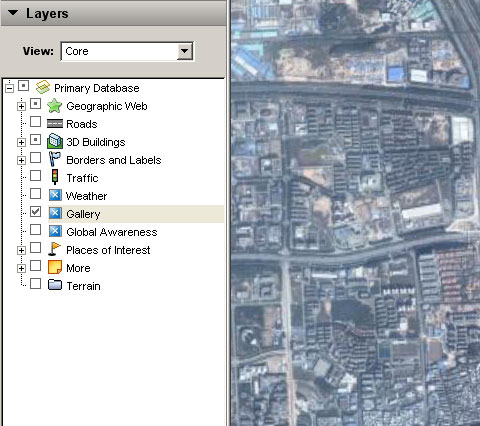
When I run a proxy program, and open Google Earth again, the Google Earth Community layer is right there, everything is ok.
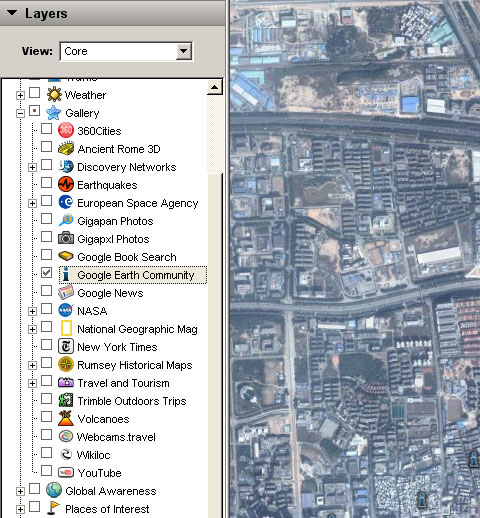
Then I close the proxy program and click the layer again, it's tell me "Fetch of NetworkLink failed(http://mw1.google.com/): Connect Failed."

That mean the Weather,Gallery and Global Awareness layer is blocked in China. Google Earth Community is in the Gallery layer, so it cannot be open again.
If the Chinese government is blocking its own citizens from seeing where their leaders live, whereas the rest of the world can see just fine, we're talking some major institutional paranoia.
Google's map and satellite-photo service offered Chinese Internet users something they rarely could see: a bird's-eye view of the secret compound of Zhongnanhai(located west of the Forbidden City), where the country's top leaders live and work.
But in recent weeks, some layer of Google Earth(such as Google Earth Community) could not load and work in China. The Google Earth Community is an online forum which is dedicated to producing placemarks of interesting or educational perspectives. It may be found on the Google Earth webpage or under the Help section on the program itself. After downloading a placemark, it will automatically run Google Earth (if not opened), and fly to the area specified by the person who placed it. Once there, you can add it to your "My Places" by right clicking on the icon and selecting "Save to My Places". Additionally, anyone can post a placemark for others to download; as long as you have an account.

When I run a proxy program, and open Google Earth again, the Google Earth Community layer is right there, everything is ok.

Then I close the proxy program and click the layer again, it's tell me "Fetch of NetworkLink failed(http://mw1.google.com/): Connect Failed."

That mean the Weather,Gallery and Global Awareness layer is blocked in China. Google Earth Community is in the Gallery layer, so it cannot be open again.
If the Chinese government is blocking its own citizens from seeing where their leaders live, whereas the rest of the world can see just fine, we're talking some major institutional paranoia.
Friday, October 24, 2008
China Internet Censorship After Olympic Games
As Beijing 2008 Olympic Games closed, the Internet censorship in China further tightened. Undeniably, this deterioration has affected and frustrated an increasing number of netizens in China.
lot's of foreign websites have been blocked again after the Beijing Olympics drew to an end. Meanwhile, although other foreign websites remain approachable in China, some of their touchy contents are actually not accessible.
lot's of foreign websites have been blocked again after the Beijing Olympics drew to an end. Meanwhile, although other foreign websites remain approachable in China, some of their touchy contents are actually not accessible.
Sunday, August 3, 2008
Websites Unblocked in China
It seems that the Chinese Wikipedia is unblocked in China now. The unblocking of the Chinese Wikipedia in China has probably been extended to cover the whole of China. Chinese users have direct access Chinese Wikipedia from very different corners of the country.
Not only with Chinese Wikipedia, this unblocking also looks like this was part of a broader opening up - mainlanders now have access to a lot of sites. Here's a rather representative list of sites that are now available in China, which include newspaper, magazine and NGO web sites previously hard blocked.
Not only with Chinese Wikipedia, this unblocking also looks like this was part of a broader opening up - mainlanders now have access to a lot of sites. Here's a rather representative list of sites that are now available in China, which include newspaper, magazine and NGO web sites previously hard blocked.
Western media
- Chinese Reuters
- Chinese Wikipedia
- Radio Free Asia
- Voice of America
- Wall Street Journal
- Financial Times Chinese
Hong Kong media
Taiwan media
NGOs
Thursday, July 24, 2008
SourceForge Unblocked in China
After a month hiatus, SourceForge, the world's largest development and download repository of Open Source code and applications, is again accessible from China on the eve of Beijing 2008 Olympic Games.
Chinese authorities has never admitted to blocking access to SourceForge, the only way for people in China to reach the site was by using a proxy server based outside of the country. There has been also no official confirmation that the website has been unblocked, but China unblocked it anyway. The Chinese authorities had promised to give foreign journalists more freedom in the run-up to this summer's Olympic Games.
China censors internet content that it finds objectionable, usually political material and occasionally pornography. The SourceForge blocking may be related to the author of SourceForge's anti-China protests of Beijing Olympic Games. China programmers needs SourceForge, and SourceForge is a professional technology website without political material. Now, SourceForge has been unblocked in China, Chinese programmers should enjoy SourceForge while it's available because we may never know when it will disappear.
Chinese authorities has never admitted to blocking access to SourceForge, the only way for people in China to reach the site was by using a proxy server based outside of the country. There has been also no official confirmation that the website has been unblocked, but China unblocked it anyway. The Chinese authorities had promised to give foreign journalists more freedom in the run-up to this summer's Olympic Games.
China censors internet content that it finds objectionable, usually political material and occasionally pornography. The SourceForge blocking may be related to the author of SourceForge's anti-China protests of Beijing Olympic Games. China programmers needs SourceForge, and SourceForge is a professional technology website without political material. Now, SourceForge has been unblocked in China, Chinese programmers should enjoy SourceForge while it's available because we may never know when it will disappear.
Wednesday, June 25, 2008
SourceForge Blocked In China
SourceForge, the world's largest development and download repository of Open Source code and applications, appears to blocked in Mainland China on the eve of Beijing 2008 Olympic Games. A screen copy of the command "tracert www.sourceforge.net" shows that the problem is a router inside China Telecom.
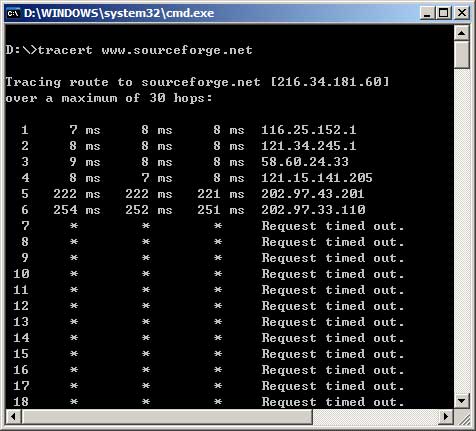
The current blocking may be related to the recent anti-China protests of Beijing Olympic Games, which began on 8 August in Beijing. Some days before, the author of a very popular free source code editor in SourceForge named Notepad++ start to boycott Beijing 2008, he said that the action is not against Chinese people, but against Chinese government's repression in 2008 Tibetan unrest. The boycotting is surely a politic issue, but refers to human rights problems in China.
Is that the reason of this blocking? Chinese authorities regularly blocks access to websites that it finds objectionable, including those dealing with politically sensitive subjects. That's what we have been. Blocked.

The current blocking may be related to the recent anti-China protests of Beijing Olympic Games, which began on 8 August in Beijing. Some days before, the author of a very popular free source code editor in SourceForge named Notepad++ start to boycott Beijing 2008, he said that the action is not against Chinese people, but against Chinese government's repression in 2008 Tibetan unrest. The boycotting is surely a politic issue, but refers to human rights problems in China.
Is that the reason of this blocking? Chinese authorities regularly blocks access to websites that it finds objectionable, including those dealing with politically sensitive subjects. That's what we have been. Blocked.
Monday, November 12, 2007
Internet Censorship In Chinese Cyberspace
China's Internet filtering regime (the Great FireWall) is the most sophisticated effort of its kind in the world. The internet censorship in Chinese cyberspace is pervasive, sophisticated, andeffective. It comprises multiple levels of legal regulation and technical control.
The Great FireWall is unparalleled anywhere in the world and is an insult to the spirit of online freedom, the Chinese authorities use it blocking thousands of websites and censoring online news.
Because of Chinese government have deployed colossal human and financial resources to obstruct online free expression. Chinese news websites and blogs have been brought under the editorial control of the propaganda apparatus at both the national and local levels.
The use of the Internet keeps growing in China. The country now has more than 160 million Internet users and at least 1.3 million websites. But the Internet's promise of free expression and information has been nipped in the bud by the Chinese government's online censorship and surveillance system. The Govermment is afraid of reign, they want to control all of the society.
In my early report, the Chinese authorities blocks more than thousand of dedicated server in HeNan and GuangDong without any explanation, Also they use the Greate FireWall to blocks some great website like FeedBurner,Blogspot,Youtube and Flickr, prevent people to meet the unwanted material.
The Chinese authorities have a longstanding set of policies restricting the information to which citizens are exposed, and that which they may themselves publicly say. The Internet poses a new challenge to such censorship, both because of the sheer breadth of content typically available, and because sources of content are so often remote from Chinese jurisdiction, and thus much more difficult to penalize for breaching restrictions on permissible materials. There is some evidence that the government has attempted to prevent the spread of unwanted material by preventing the spread of the Internet itself, but a concomitant desire to capture the economic benefits of networked computing has led to a variety of strategies to split the difference.
For example, the government might encourage Internet access through cybercafes rather than in private spaces so that customers' surfing can be physically monitored by others in the cafe. As a technical matter, anecdotal reports have described a shifting set of barriers to surfing the web from Chinese points of access -- sites that are reported unavailable or domain names that are unknown to the system or that lead to unexpected destinations, individual pages that are blocked, and the use of search keywords that results in temporary limits to further searches.
The Great FireWall was bought from Cisco Inc. , the technologies that Cisco sold to China for backbone routing purposes have packet filtering capability, allowing the routers to filter bi-directionally at thepacket level and to implement up to 750,000 different filtering rules. These systems are designed to combat various Internet attacks, including Denial of Service (DoS) attacks and the spread of worms andviruses. These same techniques can beapplied to block political content. The particular technique described in Cisco Systems to be Key Supplier for Building China's Nation-Wide IP Backbone. Also, China regularly blocks access to Web sites that it finds objectionable, including those dealing with politically sensitive subjects.
Activists and human rights organizations have for years charged Cisco and other Westerncorporations with actively assisting China in developing censorship and surveillance systems. Companies such as Microsoft and Cisco respond to these charges by suggesting that they simplysell the technology to China; thus, they cannot and should not control how their customers use what theyhave bought.
The Great FireWall is unparalleled anywhere in the world and is an insult to the spirit of online freedom, the Chinese authorities use it blocking thousands of websites and censoring online news.
Because of Chinese government have deployed colossal human and financial resources to obstruct online free expression. Chinese news websites and blogs have been brought under the editorial control of the propaganda apparatus at both the national and local levels.
The use of the Internet keeps growing in China. The country now has more than 160 million Internet users and at least 1.3 million websites. But the Internet's promise of free expression and information has been nipped in the bud by the Chinese government's online censorship and surveillance system. The Govermment is afraid of reign, they want to control all of the society.
In my early report, the Chinese authorities blocks more than thousand of dedicated server in HeNan and GuangDong without any explanation, Also they use the Greate FireWall to blocks some great website like FeedBurner,Blogspot,Youtube and Flickr, prevent people to meet the unwanted material.
The Chinese authorities have a longstanding set of policies restricting the information to which citizens are exposed, and that which they may themselves publicly say. The Internet poses a new challenge to such censorship, both because of the sheer breadth of content typically available, and because sources of content are so often remote from Chinese jurisdiction, and thus much more difficult to penalize for breaching restrictions on permissible materials. There is some evidence that the government has attempted to prevent the spread of unwanted material by preventing the spread of the Internet itself, but a concomitant desire to capture the economic benefits of networked computing has led to a variety of strategies to split the difference.
For example, the government might encourage Internet access through cybercafes rather than in private spaces so that customers' surfing can be physically monitored by others in the cafe. As a technical matter, anecdotal reports have described a shifting set of barriers to surfing the web from Chinese points of access -- sites that are reported unavailable or domain names that are unknown to the system or that lead to unexpected destinations, individual pages that are blocked, and the use of search keywords that results in temporary limits to further searches.
The Great FireWall was bought from Cisco Inc. , the technologies that Cisco sold to China for backbone routing purposes have packet filtering capability, allowing the routers to filter bi-directionally at thepacket level and to implement up to 750,000 different filtering rules. These systems are designed to combat various Internet attacks, including Denial of Service (DoS) attacks and the spread of worms andviruses. These same techniques can beapplied to block political content. The particular technique described in Cisco Systems to be Key Supplier for Building China's Nation-Wide IP Backbone. Also, China regularly blocks access to Web sites that it finds objectionable, including those dealing with politically sensitive subjects.
Activists and human rights organizations have for years charged Cisco and other Westerncorporations with actively assisting China in developing censorship and surveillance systems. Companies such as Microsoft and Cisco respond to these charges by suggesting that they simplysell the technology to China; thus, they cannot and should not control how their customers use what theyhave bought.
Saturday, November 3, 2007
Google Blogspot And Google Pages Unblocked In China
The free blog hosting services Google Blogspot and the free homepage hosting Google Pages are accessible in China today.
Some days before, Google BlogSpot is blocked again after the the 17th Party Congress finished in BeiJing , but after YouTube unblocked, the Google Blogspot and Google Pages both unblocked now, that surprise me, those blocking are extremely arbitrary.
Hope that is not temporary unblocked.
Update: Google Blogger(Blogspot) was blocked in China again a week ago.
Some days before, Google BlogSpot is blocked again after the the 17th Party Congress finished in BeiJing , but after YouTube unblocked, the Google Blogspot and Google Pages both unblocked now, that surprise me, those blocking are extremely arbitrary.
Hope that is not temporary unblocked.
Update: Google Blogger(Blogspot) was blocked in China again a week ago.
Friday, October 26, 2007
How To Visit Google BlogSpot In China
Most efforts(using proxy or editing hosts file, for example) to bypass The Wall can work, . I'm going to write 2 methods dedicated for blogspot.
The easier way is to use pkblogs, who provides accesss to blogs "blocked in India, Pakistan, Iran or China". But I think pkblogs itself may be blocked soon.
The more technical way (by Dance In The Dark) is to assign "*.blogspot.com" to an alternative IP address which is not banned yet, by configuring proxy settings of Firefox with following steps:
Problems:
The easier way is to use pkblogs, who provides accesss to blogs "blocked in India, Pakistan, Iran or China". But I think pkblogs itself may be blocked soon.
The more technical way (by Dance In The Dark) is to assign "*.blogspot.com" to an alternative IP address which is not banned yet, by configuring proxy settings of Firefox with following steps:
- Create a new text file and write the following codes
function FindProxyForURL(url,host){
if(dnsDomainIs(host, ".blogspot.com")){
return "PROXY 72.14.219.190:80";
}
} - Save it as C:\Program Files\Mozilla Firefox\local\proxy.pac
- In Firefox, open Tools(menu)->Options(menu)->Advanced(tab)->Network(tab)->Connect, Settings(button)->Automatically Proxy Configuration URL(box), enter:
file:///C:/Program%20Files/Mozilla%20Firefox/local/proxy.pac
- Say OK to close all dialogs. Now you can try someone.blogspot.com
Problems:
- The IP we used here 72.14.219.190 may be banned in the future, you will need to google for new solutions at that time.
- IE is also known to support auto proxy configuration, but I can't get it work. (via)
Thursday, October 25, 2007
Google BlogSpot Blocked Again In China
The most popular blog host BlogSpot is blocked again after the the 17th Party Congress finished in BeiJing.
In the south China, BlogSpot is not accessible all the while, but in the north China, BlogSpot was suddenly accessible on October 15 in BeiJing. The 17th Party Congress started on October 15. Some believe that the current unblocking may be related to the 17th Party Congress, temporarily allowing the major foreign journalists to access their favorite BlogSpot. So the BlogSpot was only unblock in north China, on October 15. After the Congress's finishing, the BlogSpot is blocked again.
An unblocking of the site last year led to the availability of a Shanghai-based foreign blogger known as Chinabounder, whose blog recounted the author's sexual exploits with Chinese women while working as an English teacher. The posts ultimately led to an unsuccessful hunt for the author and a temporary closing of the blog(via).
In the south China, BlogSpot is not accessible all the while, but in the north China, BlogSpot was suddenly accessible on October 15 in BeiJing. The 17th Party Congress started on October 15. Some believe that the current unblocking may be related to the 17th Party Congress, temporarily allowing the major foreign journalists to access their favorite BlogSpot. So the BlogSpot was only unblock in north China, on October 15. After the Congress's finishing, the BlogSpot is blocked again.
An unblocking of the site last year led to the availability of a Shanghai-based foreign blogger known as Chinabounder, whose blog recounted the author's sexual exploits with Chinese women while working as an English teacher. The posts ultimately led to an unsuccessful hunt for the author and a temporary closing of the blog(via).
Wednesday, September 12, 2007
FeedBurner Is Completely Blocked In China
At the end of August, when FeedBurner is blocked by China Telecom (most in south China), some of the China Netcom (most in north China) users may glad they still be able to visit feedburner. Today, FeedBurner is blocked by China Netcom too, so the China Netcom users must say goodbye to the FeedBurner.
So far, all Chinese users were unable to visit FeedBurner now.
This time is different from last year, in August 1,2006, FeedBurner is also blocked temporarily, one day later it’s came back. But this time, FeedBurner is blocked lot's of days, and it's still out there, which reminds us that this blockade may be permanent in the nature.
Even so, the Chinese users can still use Google Reader to visit FeedBurner, but if Google Reader becomes the next one, what should Chinese users do?
So far, all Chinese users were unable to visit FeedBurner now.
This time is different from last year, in August 1,2006, FeedBurner is also blocked temporarily, one day later it’s came back. But this time, FeedBurner is blocked lot's of days, and it's still out there, which reminds us that this blockade may be permanent in the nature.
Even so, the Chinese users can still use Google Reader to visit FeedBurner, but if Google Reader becomes the next one, what should Chinese users do?
Sunday, September 2, 2007
China Internet Censorship Goes Crazy
Are they going crazy? Before they would warn and order the webmasters to delete "harmful" information from their websites, sometimes they just blocked the website. But now thousand of websites would be blocked if they are so unlucky to be hosted by the same IDC company with a "harmful" website.
Yes, in the last month, most of the interactive website(including forum, guestbook, blog) in China were blocked by the Chinese authorities. Some believe this is because of the 17th National Congress of the Communist Party of China opening, the Chinese authorities want a social stability.
Chinese authorities often blocks an entire Web site, even if only parts of the site contain sensitive information. Just in the last month, more than thousand of dedicated server in HeNan TeleCom room and ShanTou TeleCom room were closed forcibly. thousand of sites were blocked included those on health, education, news, entertainment, religion. Also they use the Greate FireWall to blocks some great website like FeedBurner and Flickr.
This month, the Chinese authorities will finish their jobs, closing the rest of "illegal website". So when the 17th National Congress of the Communist Party of China is opening, the Chinese cyberspace will become a very harmonious and stable.
Not a country renowned for freedom of speech, China has nevertheless outdone itself with more internet censorship that would make them proud.
Yes, in the last month, most of the interactive website(including forum, guestbook, blog) in China were blocked by the Chinese authorities. Some believe this is because of the 17th National Congress of the Communist Party of China opening, the Chinese authorities want a social stability.
Chinese authorities often blocks an entire Web site, even if only parts of the site contain sensitive information. Just in the last month, more than thousand of dedicated server in HeNan TeleCom room and ShanTou TeleCom room were closed forcibly. thousand of sites were blocked included those on health, education, news, entertainment, religion. Also they use the Greate FireWall to blocks some great website like FeedBurner and Flickr.
This month, the Chinese authorities will finish their jobs, closing the rest of "illegal website". So when the 17th National Congress of the Communist Party of China is opening, the Chinese cyberspace will become a very harmonious and stable.
Not a country renowned for freedom of speech, China has nevertheless outdone itself with more internet censorship that would make them proud.
Wednesday, August 29, 2007
FeedBurner Blocked By China
FeedBurner, the most popular and powerful worldwide RSS service provider, is blocked by Chinese authorities for the censorship tonight.
Now Chinese user unable to visit feeds.feedburner.com, when I try to ping feedburner from China, it will return "Request timed out".
When I issued traceroute requests to feedburner in China, I found the IP packets are blocked by 202.97.33.110. This IP address is a main router of China Telecom.
It's confirm that the Greate FireWall's IP blocking works. The FeedBurner is blocked in China again.
This is not the first time that Chinese authorities blocks FeedBurner, in August 1,2006, FeedBurner is also blocked temporarily, one day later it's came back, but now it's blocked again.
Why Chinese authorities blocks FeedBurner? Because Feedburner provides content from countless websites. It could conceivably carry some information the Chinese authorities think it shouldn't. So they try to blocks it, Although this will let them be against lot's of Chinese bloggers.
Although the Chinese bloggers could visit FeedBurner via proxy server, only few people use proxy in fact, maybe because proxy is slow and instable.
I wish FeedBurner will come back tomorrow.
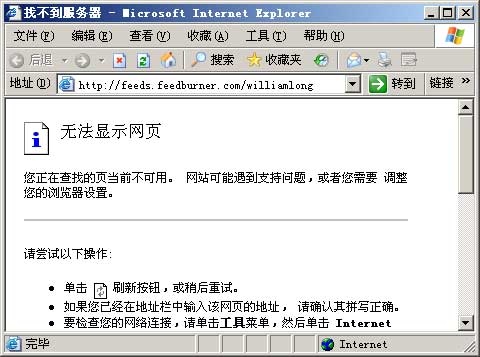
Now Chinese user unable to visit feeds.feedburner.com, when I try to ping feedburner from China, it will return "Request timed out".

When I issued traceroute requests to feedburner in China, I found the IP packets are blocked by 202.97.33.110. This IP address is a main router of China Telecom.
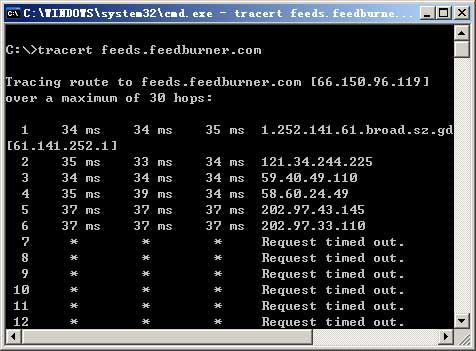
It's confirm that the Greate FireWall's IP blocking works. The FeedBurner is blocked in China again.
This is not the first time that Chinese authorities blocks FeedBurner, in August 1,2006, FeedBurner is also blocked temporarily, one day later it's came back, but now it's blocked again.
Why Chinese authorities blocks FeedBurner? Because Feedburner provides content from countless websites. It could conceivably carry some information the Chinese authorities think it shouldn't. So they try to blocks it, Although this will let them be against lot's of Chinese bloggers.
Although the Chinese bloggers could visit FeedBurner via proxy server, only few people use proxy in fact, maybe because proxy is slow and instable.
I wish FeedBurner will come back tomorrow.
Monday, August 20, 2007
Google Answers Censorship In China
Today, Google and Tianya (a famous Chinese community website) launched a free Q&A service - "Tianya Answers". Some believe this is a strong competitors of "Baidu Zhidao" (the biggest Q&A site in China). In the bottom of "Tianya Answers" we can get "Google technology provide".
Social search has been Google's weaknesses, Google Answers is also defeat by Yahoo Answers. In China, Baidu Zhidao is the biggest Q&A service. Google launches Q&A service in China will enable Google to compete with Baidu. But in the "Tianya Answers", we found some of the very obvious Google-specific issues.
When we register a new account, we can get the following message : "Please note that according to Chinese laws, your IP information will be recorded for at least 60 days. And it will be will be provided to government agencies when we get the request."
That is mean, Google will complied with requests from the Chinese authorities to furnish information regarding an IP address of Google's users, and Google will only simply state that they just conform to the laws of the countries in which they operate.
Before in 2006, Google launches the Chinese version of its search engine to be censored (google.cn). Google use so-call SafeSearch filter used to keep people away from "bad" information, such as "subversive" material.
Google being in China helps itself more than China and simply does not fit into the "Don't Be Evil" mantra, but Google also known little about China's censorship. The "community website" is the "high-risk" project, they must face the work of looking out for and cleaning up "harmful information", if they do not get the "harmful information" out, they will be out. So they choice to collaborates with the Chinese regime.
Google "Don't Be Evil" ... Not in China.
Sources in Chinese .
Social search has been Google's weaknesses, Google Answers is also defeat by Yahoo Answers. In China, Baidu Zhidao is the biggest Q&A service. Google launches Q&A service in China will enable Google to compete with Baidu. But in the "Tianya Answers", we found some of the very obvious Google-specific issues.
When we register a new account, we can get the following message : "Please note that according to Chinese laws, your IP information will be recorded for at least 60 days. And it will be will be provided to government agencies when we get the request."
That is mean, Google will complied with requests from the Chinese authorities to furnish information regarding an IP address of Google's users, and Google will only simply state that they just conform to the laws of the countries in which they operate.
Before in 2006, Google launches the Chinese version of its search engine to be censored (google.cn). Google use so-call SafeSearch filter used to keep people away from "bad" information, such as "subversive" material.
Google being in China helps itself more than China and simply does not fit into the "Don't Be Evil" mantra, but Google also known little about China's censorship. The "community website" is the "high-risk" project, they must face the work of looking out for and cleaning up "harmful information", if they do not get the "harmful information" out, they will be out. So they choice to collaborates with the Chinese regime.
Google "Don't Be Evil" ... Not in China.
Sources in Chinese .
Friday, August 10, 2007
The Secret Of Internet Censorship In China
As we know, whether blog or forum is censored in China, people can not say anything in China. What can be said, and what can not be said is a question for all of us, today, I will introduce some of the legal basis in China: "Computer Information Network and Internet Security, Protection and Management Regulations"
The management regulations is approved by the State Council of China on December 11 1997 and promulgated by the Ministry of Public Security of China on December 30, 1997. This is a legal basis. In that regulations, a detailed definition of "harmful information" the specific meaning, publishing "harmful information" is forbidden. Then what is the "harmful information"?
According to the Section Five of the Act provides that no individual may use the Internet to create, replicate, retrieve, or spread the following kinds of information:
(1) Inciting to resist or breaking the Constitution or laws or the implementation of administrative regulations;
(2) Inciting to overthrow the government or the socialist system;
(3) Inciting division of the country, harming national unification;
(4) Inciting hatred or discrimination among nationalities or harming the unity of the nationalities;
(5) Making falsehoods or distorting the truth, spreading rumors, destroying the order of society;
(6) Promoting feudal superstitions, sexually suggestive material, gambling, violence, murder,
(7) Terrorism or inciting others to criminal activity; openly insulting other people or distorting the truth to slander people;
(8) Injuring the reputation of state organs;
(9) Other activities against the Constitution, laws or administrative regulations.
Evidently, these nine categories of information is harmful information. I think, in one word, any threat to social stability statements are "harmful information". Anyone want to publishing "harmful information" is illegal. This is the so-called "Internet censorship in China", If you knew about this, you will be able to understand those weird things in China's cyberspace.
The management regulations is approved by the State Council of China on December 11 1997 and promulgated by the Ministry of Public Security of China on December 30, 1997. This is a legal basis. In that regulations, a detailed definition of "harmful information" the specific meaning, publishing "harmful information" is forbidden. Then what is the "harmful information"?
According to the Section Five of the Act provides that no individual may use the Internet to create, replicate, retrieve, or spread the following kinds of information:
(1) Inciting to resist or breaking the Constitution or laws or the implementation of administrative regulations;
(2) Inciting to overthrow the government or the socialist system;
(3) Inciting division of the country, harming national unification;
(4) Inciting hatred or discrimination among nationalities or harming the unity of the nationalities;
(5) Making falsehoods or distorting the truth, spreading rumors, destroying the order of society;
(6) Promoting feudal superstitions, sexually suggestive material, gambling, violence, murder,
(7) Terrorism or inciting others to criminal activity; openly insulting other people or distorting the truth to slander people;
(8) Injuring the reputation of state organs;
(9) Other activities against the Constitution, laws or administrative regulations.
Evidently, these nine categories of information is harmful information. I think, in one word, any threat to social stability statements are "harmful information". Anyone want to publishing "harmful information" is illegal. This is the so-called "Internet censorship in China", If you knew about this, you will be able to understand those weird things in China's cyberspace.
Sources:William Long: The internet censership's law basis (Chinese)
Subscribe to:
Comments (Atom)